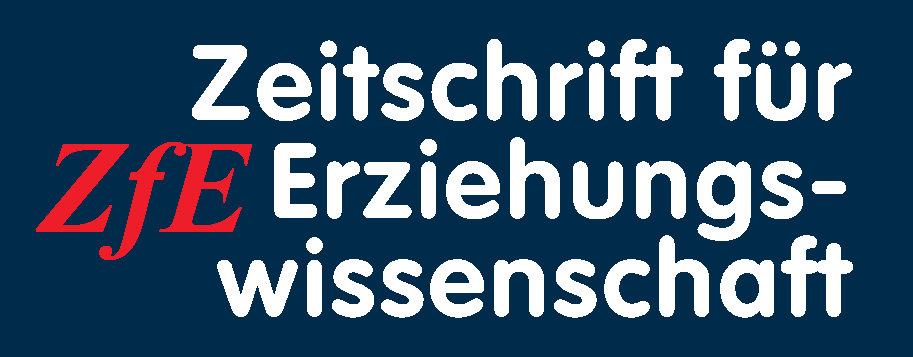ABOUT ZfE
PROFILE
Zeitschrift für Erziehungswissenschaft (ZfE) was founded in 1998. Originally, ZfE was published by Leske und Budrich, since 2004 the publisher has been VS Verlag für Sozialwissenschaften (now: Springer VS, part of Springer Nature).
ZfE has developed into the flagship of educational science and research in Germany. The journal is conceived as a representative scientific periodical covering the entire scope of research into education. We exclusively publish top quality original contributions, following an expert review process.
Owing to the editors, the internationally composed advisory board and the choice of topics, ZfE represents the international character of education science, dealing with the entire human lifecycle. By accepting English language contributions and including English abstracts in all contributions, ZfE ensures a linkage to discourse beyond Germany as well as raising the international visibility of German language research.
ZfE is thus a journal that presents international and interdisciplinary developments that are important for research in education — it is reliable, factual, and apprehensible.
ZfE is guided by the following principles:
- Opening of high-quality research to a broad scientific public,
- Commitment to the interdisciplinary nature of education science, abandonment of pedagogical provinciality,
- consequent integration of international development of educational research,
- creation of a forum for dealing with processes in education and socialisation across the human lifespan.
ETHICS
In 1998, ZfE was the first educational science journal in Germany to introduce the “review principle”. The practice of “blind peer reviews” serves the assurance of quality as well as opening access to international citation indices.
ZfE is a member of the Committee on Publication Ethics (COPE) and thus complies with COPE regulations. Therefore, complaints are handled as follows: the “editor in chief” will assess the authors’ arguments as well as the reviews and statements, and decide whether (a) the rejection will be upheld (b) a further independent statement/review is needed, or (c) the complaint is considered justified. The complainant will be notified about the decision, and decisions about complaints are ultimate.
HOW WE WORK
Contributions are checked for their formal suitability after submission. The board of editors in chief subsequently submits the contribution to an “acting editor” who selects the reviewers. As a rule, two (sometimes three) blind peer reviews are commissioned — together with a statement from the acting editors, the reviews are handed to the board of editors in chief who take a stance and rule by majority vote against or for accepting the contribution. Authors are then informed about the decision. This way, the publisher group and board of editors jointly determine the journal’s profile.
STRUCTURE
Besides a general part to which authors can freely submit their contributions, the journal provides for one larger or two smaller thematic foci. In the case of comprehensive thematic issues, the general part might be omitted. ZfE moreover strives to publish one or two issues a year without thematic focus, not least because of a continual increase in free contributions. In rare cases, ZfE publishes collection reviews.
Each thematic issue is introduced by an encyclopaedic contribution that frames the topic’s history, semantics and state of research. Thereby, readers who are unfamiliar with the specific topic will be introduced to the topic. The thematic focus then contains a number of original, thematically relevant contributions regarding current German language and international research in education science as well as interdisciplinary research and developments.
The general part contains contributions from all areas of education science and related disciplines, e.g. general pedagogy, social pedagogy, adult education, comparative education, school pedagogy, educational psychology, educational sociology…
Occasionally, ZfE also publishes controversies — a dedicated position paper and replies are published. In this regard, we also publish interviews about controversial topics.
HISTORY
In Germany, education science is the second-largest university discipline. Its subject has become increasingly established and professionalised since the mid-20th Century, offering a broad range of research fields. Meanwhile, more than 25 subdisciplines have been developed, and there is a high demand for overarching results that are important for all scientific branches. Education science is not only a discipline that deals with raising and teaching children. In the past decades, an expansion of pedagogical interventions has consequently addressed the human lifespan. Today, education science looks at the entire human lifecycle.
Education science has become an exemplary interdisciplinary scientific domain that has opened up to human sciences first, and subsequently social sciences. Such an opening can be observed regarding the natural sciences. A large-scale empirical grounding has become established, which is continually being developed further.
Processes of internationalisation such as the process of European unification have led to educational scientific macrostructures, e.g. the European Educational Research Association or the World Education Research Association. Many European and international co-operations exist, and interest in German education science is marked not only in the Eastern European and Asian areas.
The ZfE founding in the late 1990s is due to attention to these and other epochal developments in the education systems and corresponding disciplines. There was a demand for a publishing outlet where different tendencies could be presented in a concentrated form. An engaged team of editors and the courage shown by the publisher, Edmund Budrich, made it possible for ZfE to be founded as a research-based journal at the end of the 20th century — the 20th century also being a decade of education. A first issue was published in spring 1998. ZfE has meanwhile become well established in the community, with excellent reputation. Since 2007, the journal has been listed in the Social Sciences Citation Index where it has repeatedly reached the highest score for a German-language publication. In 2020, the Journal Impact Factor was 0.828.
